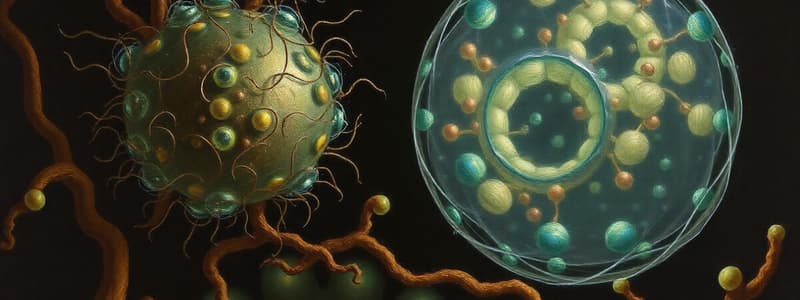Podcast
Questions and Answers
What is the principle that states that all cells arise from pre-existing cells?
What is the principle that states that all cells arise from pre-existing cells?
- Omnis cellula e cellula (correct)
- Cells can form in isolation without other cells
- All cells arise from spontaneous generation
- Cells arise through biochemical synthesis
Which statement about the modern cell theory is NOT one of its principles?
Which statement about the modern cell theory is NOT one of its principles?
- Cells contain hereditary information passed during division
- Cells can spontaneously generate under certain conditions (correct)
- All known living things are made up of cells
- All energy flow occurs within cells
Which historical figure is credited with the development of the first compound microscope?
Which historical figure is credited with the development of the first compound microscope?
- Anton van Leeuwenhoek
- Robert Hooke
- Zacharias Jansen (correct)
- Rudolph Virchow
What significant contribution did George Otto Gey make in cell biology?
What significant contribution did George Otto Gey make in cell biology?
What key conclusion did Schwann and Schleiden reach about cells?
What key conclusion did Schwann and Schleiden reach about cells?
Which of the following discoveries is most associated with advancements in cell culture techniques?
Which of the following discoveries is most associated with advancements in cell culture techniques?
Who was the first to observe a live cell under a microscope and which specimen did he examine?
Who was the first to observe a live cell under a microscope and which specimen did he examine?
In what year was the cell theory formally articulated?
In what year was the cell theory formally articulated?
What did Robert Hooke first observe when he examined cork under a microscope?
What did Robert Hooke first observe when he examined cork under a microscope?
Which of the following is NOT included in the three conclusions about cells derived by Schwann?
Which of the following is NOT included in the three conclusions about cells derived by Schwann?
Flashcards are hidden until you start studying
Study Notes
Introduction to Cell Theory
- Cell theory posits that all living organisms are composed of cells, the fundamental unit of life.
- Formulated in 1839 by Theodor Schwann and Matthias Schleiden, it has become foundational in modern biology.
- Cell theory predates major biological concepts, including Darwin's theory of evolution (1859) and Mendel's laws of inheritance (1865).
Early Discoveries in Cell Biology
- Robert Hooke first described cells in 1665, observing dead cork cell walls under a microscope.
- Hooke’s observations were documented in his work "Micrographia," although he did not identify the nucleus or organelles.
- Anton van Leeuwenhoek is credited with observing live cells in 1674, notably describing spirogyra.
Formulation of Cell Theory
- Schwann and Schleiden's discussions in 1838 catalyzed the development of cell theory based on their comparative observations of plant and animal cells.
- Schwann's treatise (1839) proposed three principles:
- Cells are the basic unit of structure and function in living organisms.
- Cells exist as distinct entities and structural components.
- Cells form through a process reminiscent of spontaneous generation, later proven incorrect.
Modern Cell Theory
- The updated modern cell theory includes:
- All known living organisms consist of cells.
- The cell serves as the structural and functional unit of life.
- Cells arise only from pre-existing cells through division, negating spontaneous generation.
- Cells contain hereditary information, passed during cell division.
- All cells share a similar chemical composition.
- Metabolism and energy flow occur within cells.
Advances in Cell Biology
- 20th-century molecular biology breakthroughs spurred rapid growth in cell biology from the 1950s onward.
- First continuous cell culture, HeLa cells, originated in 1951 from Henrietta Lacks' cervical cancer cells, marking a significant milestone in cell research.
- Development of sterile culture techniques and minimal media requirements enhanced cell study.
- Electron microscopy advancements, transfection methods, and siRNA discovery further propelled cell biology research.
Historical Timeline of Key Events
- 1595: First compound microscope credited to Jansen.
- 1655: Hooke describes "cells" in cork.
- 1674: Leeuwenhoek discovers protozoa; later observes bacteria.
- 1833: Brown identifies the cell nucleus in orchid cells.
- 1838: Schleiden and Schwann propose the cell theory.
- 1840: Albrecht von Roelliker realizes sperm and egg cells are also cells.
Studying That Suits You
Use AI to generate personalized quizzes and flashcards to suit your learning preferences.




